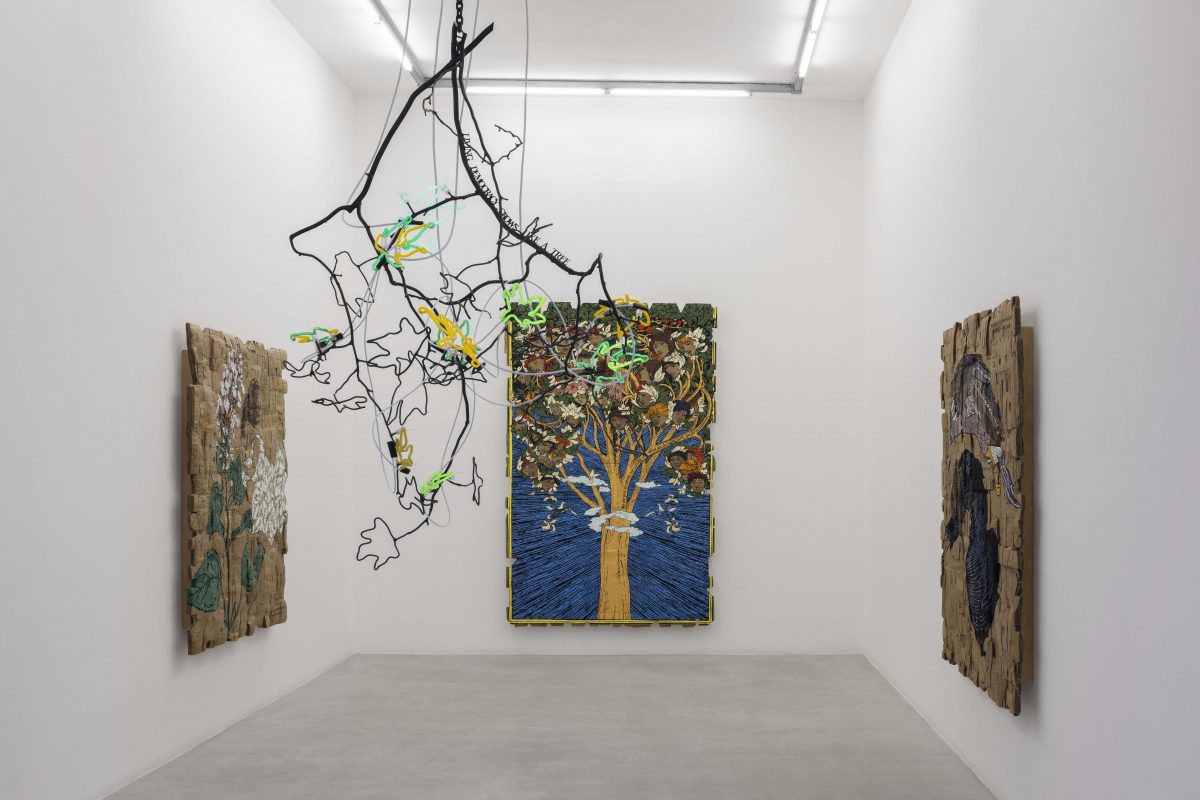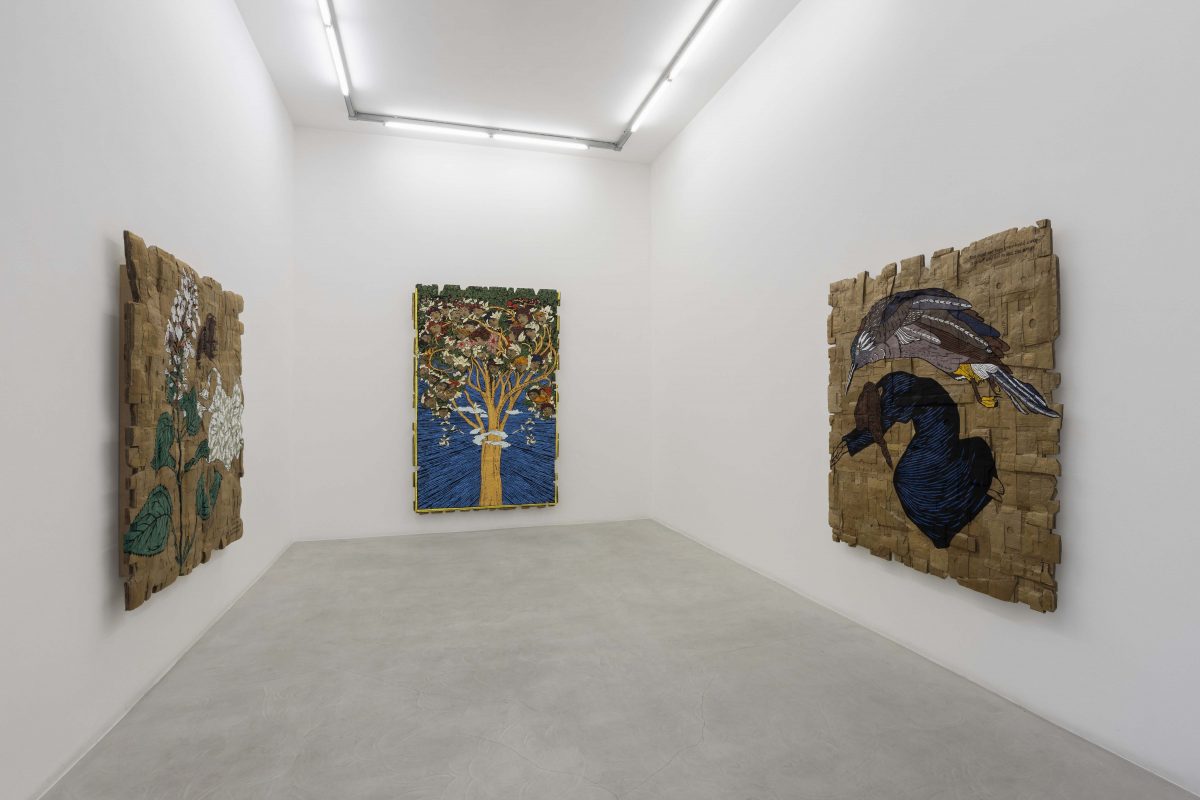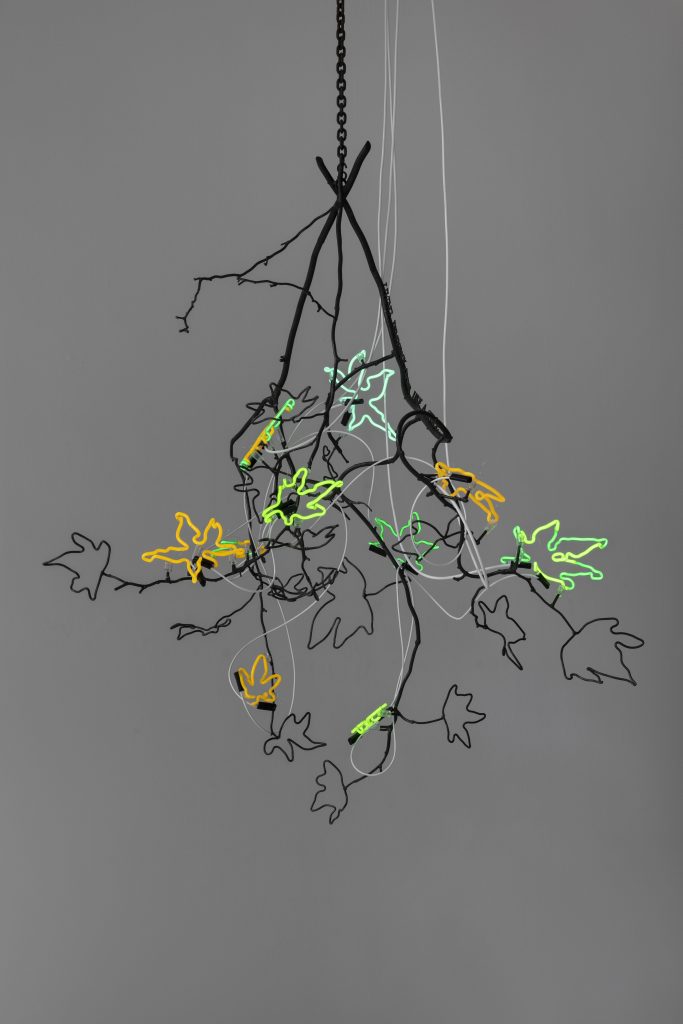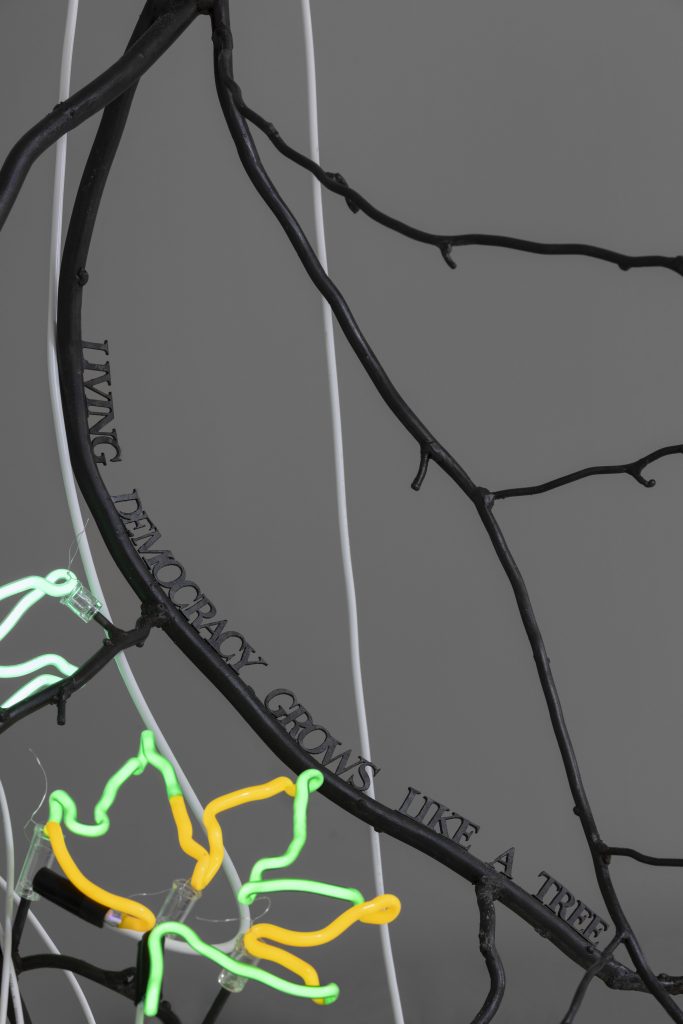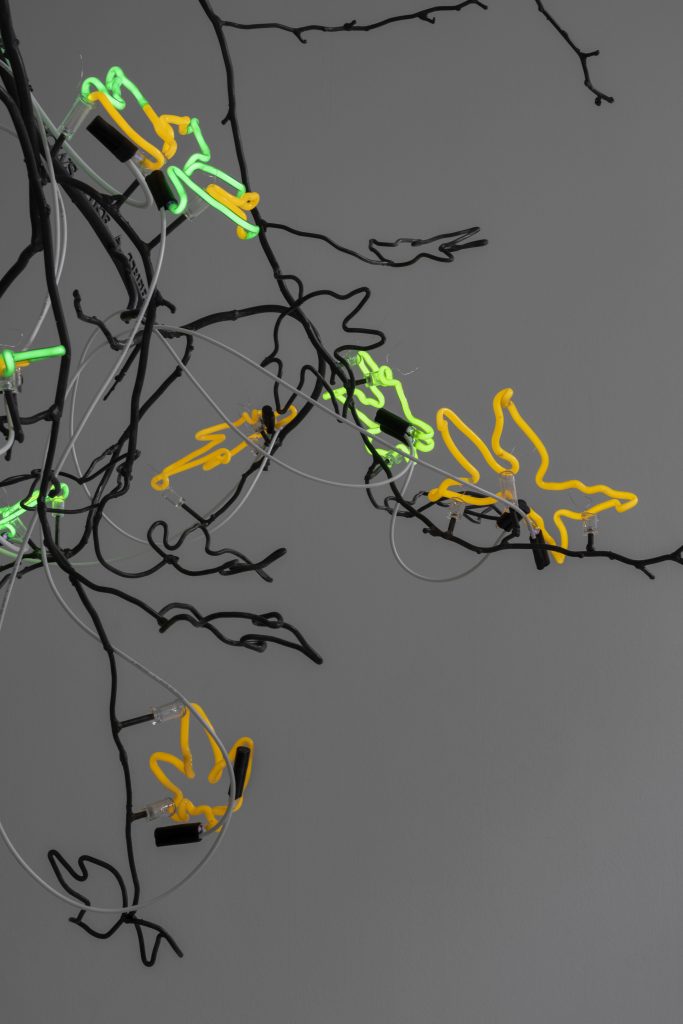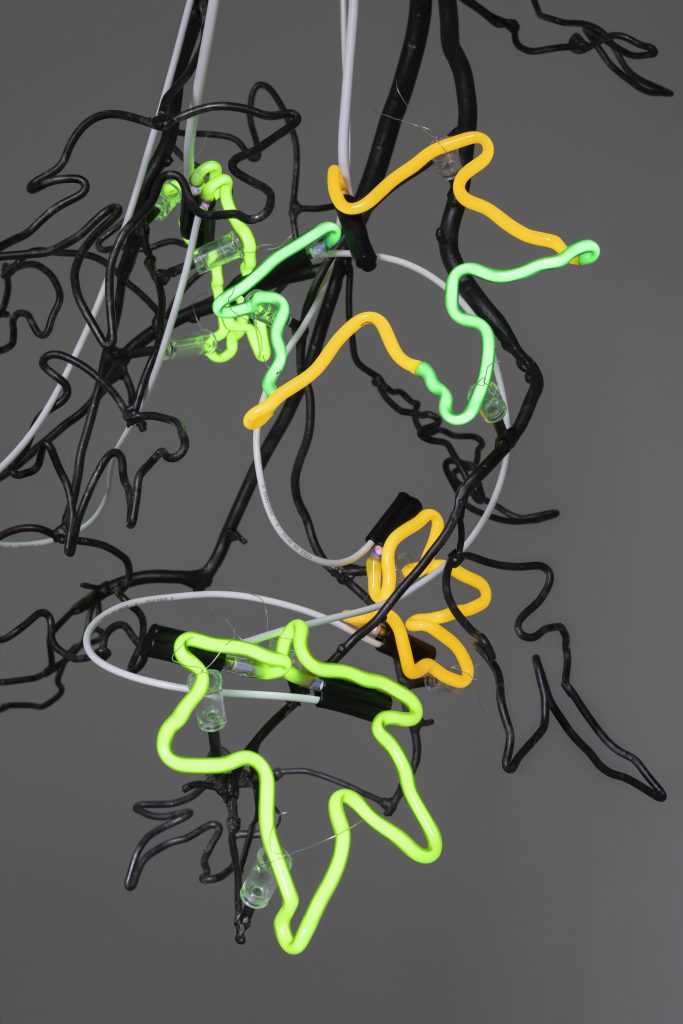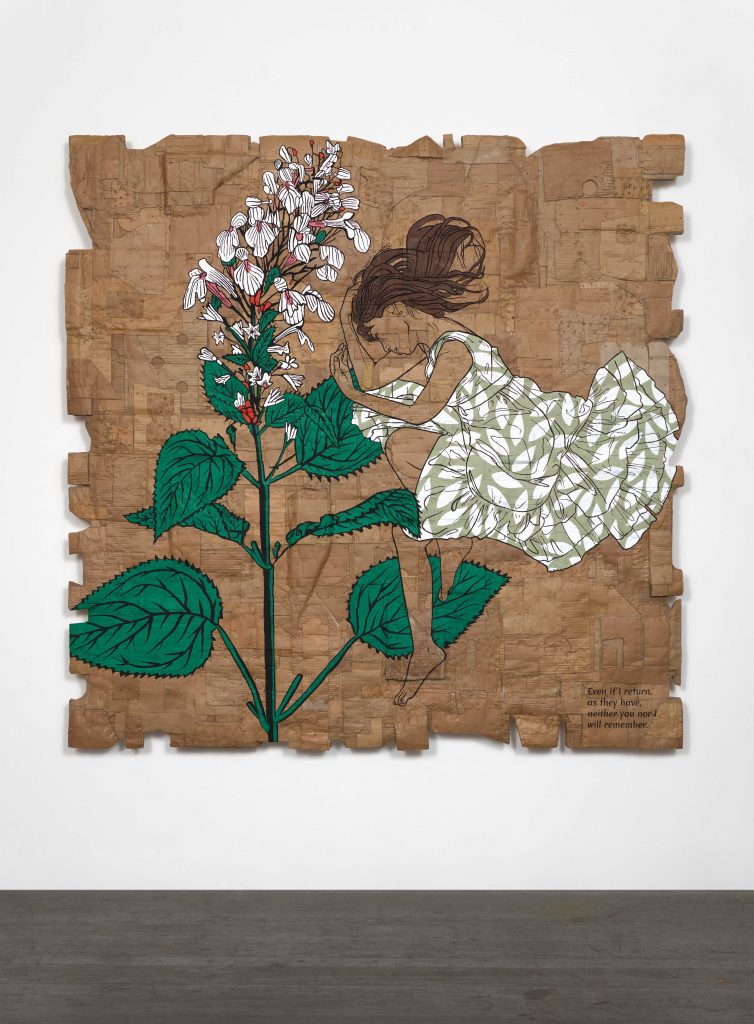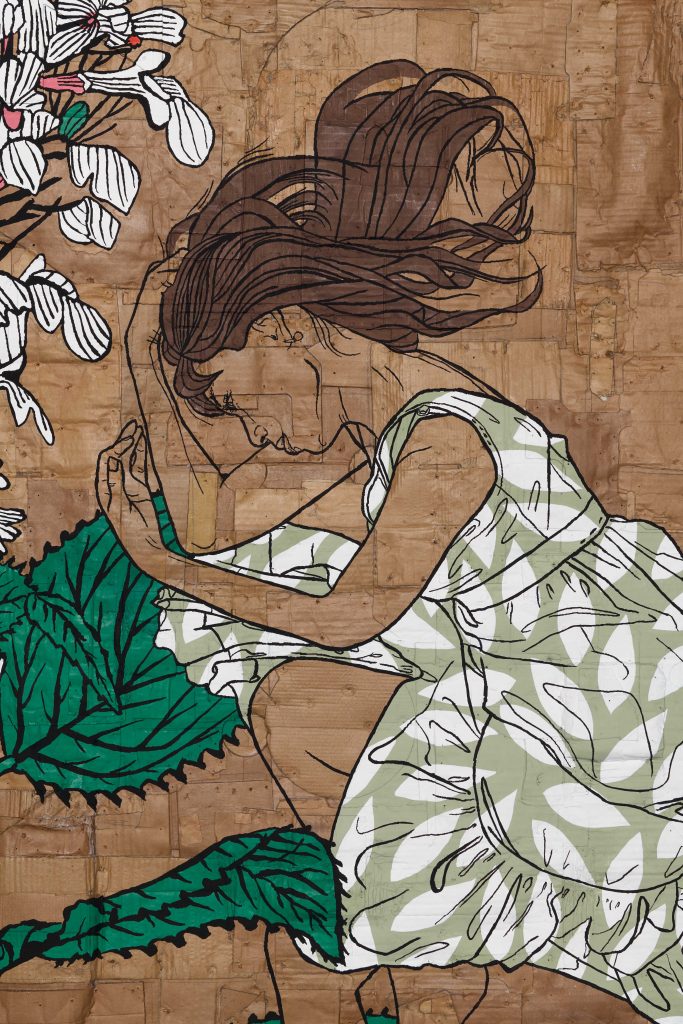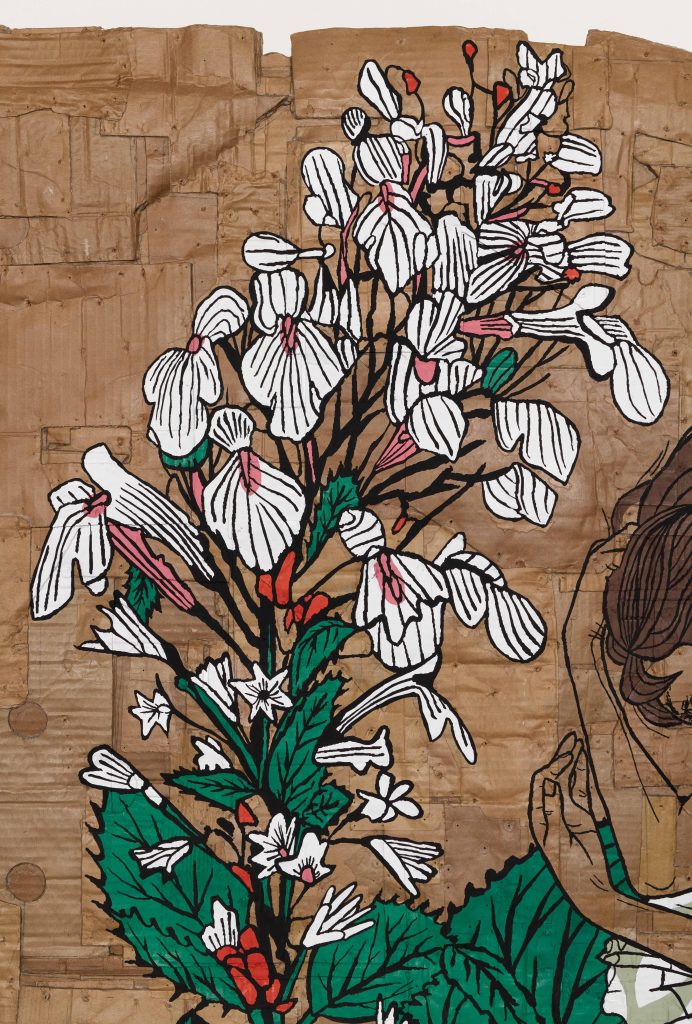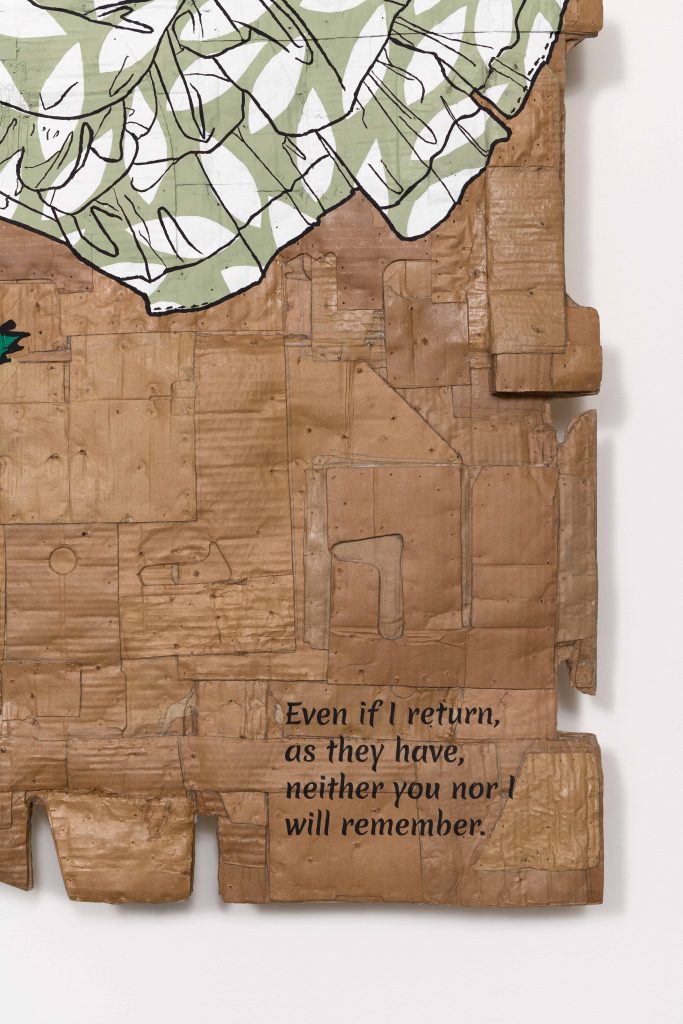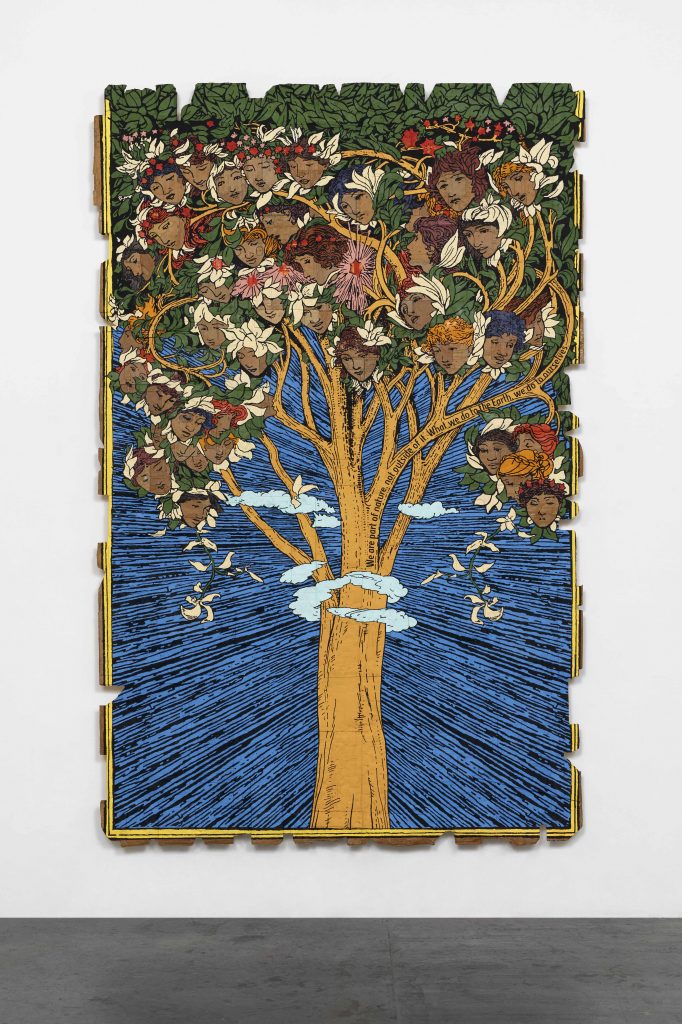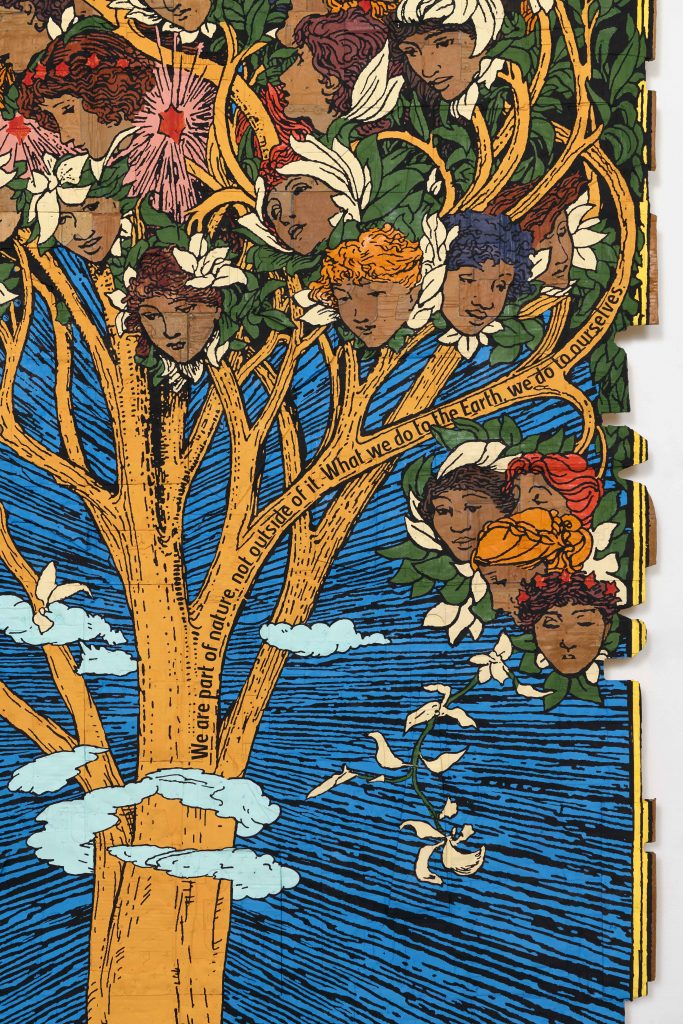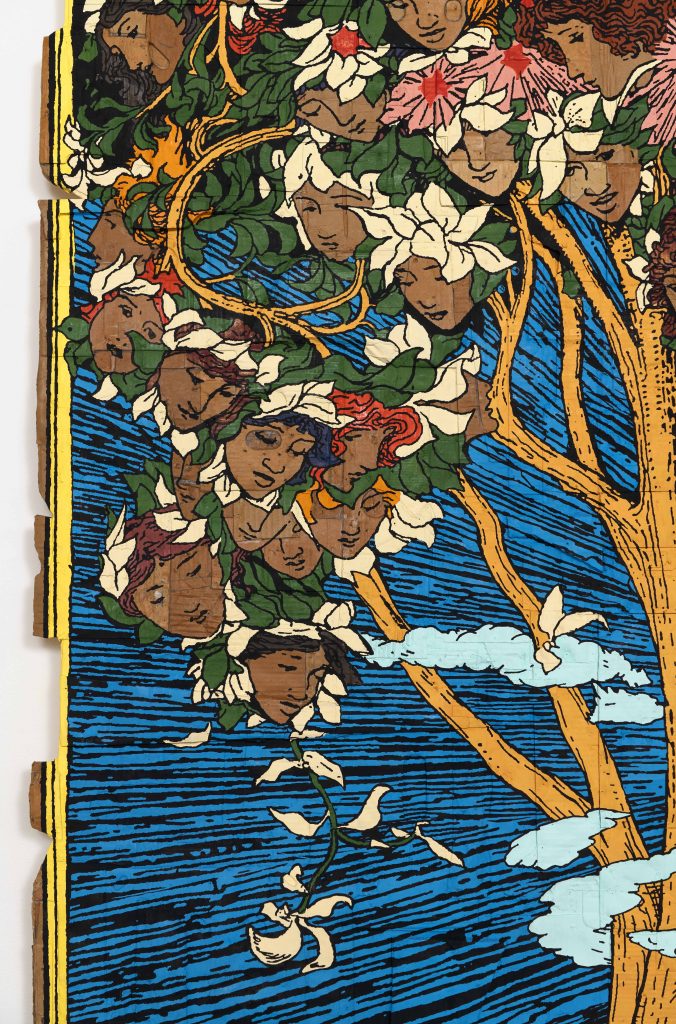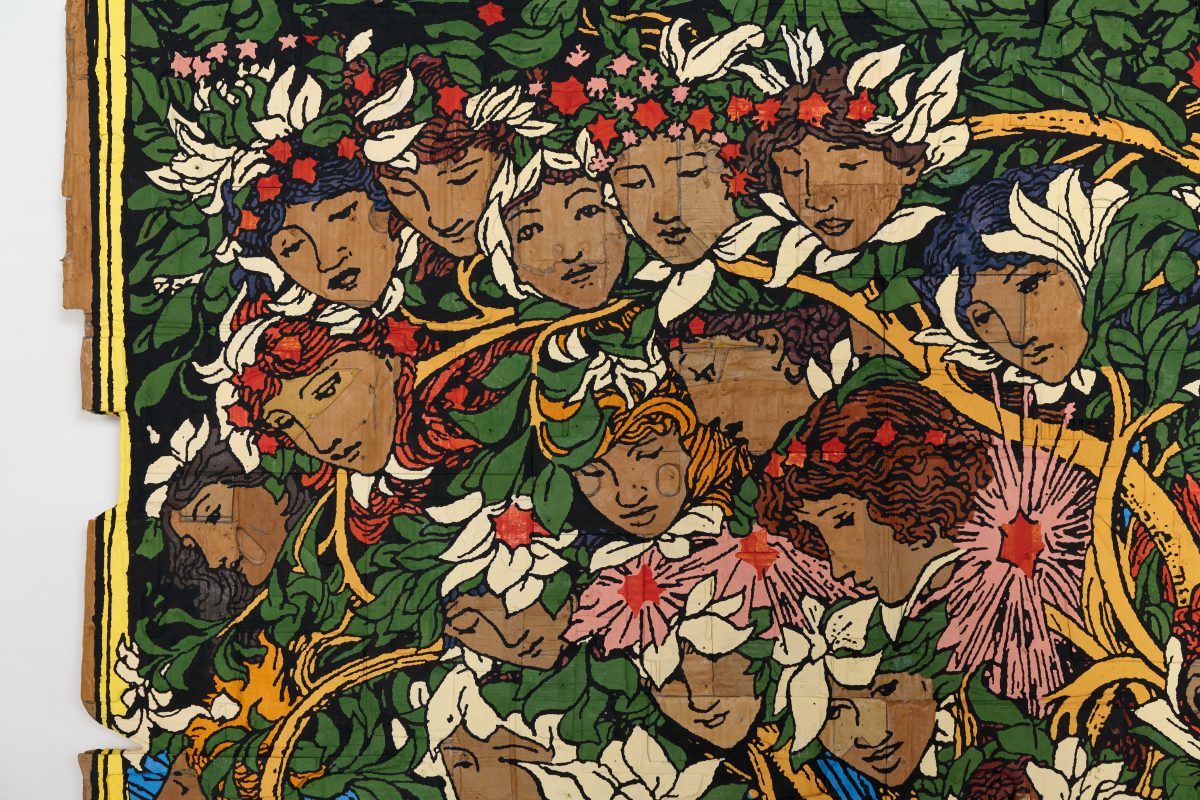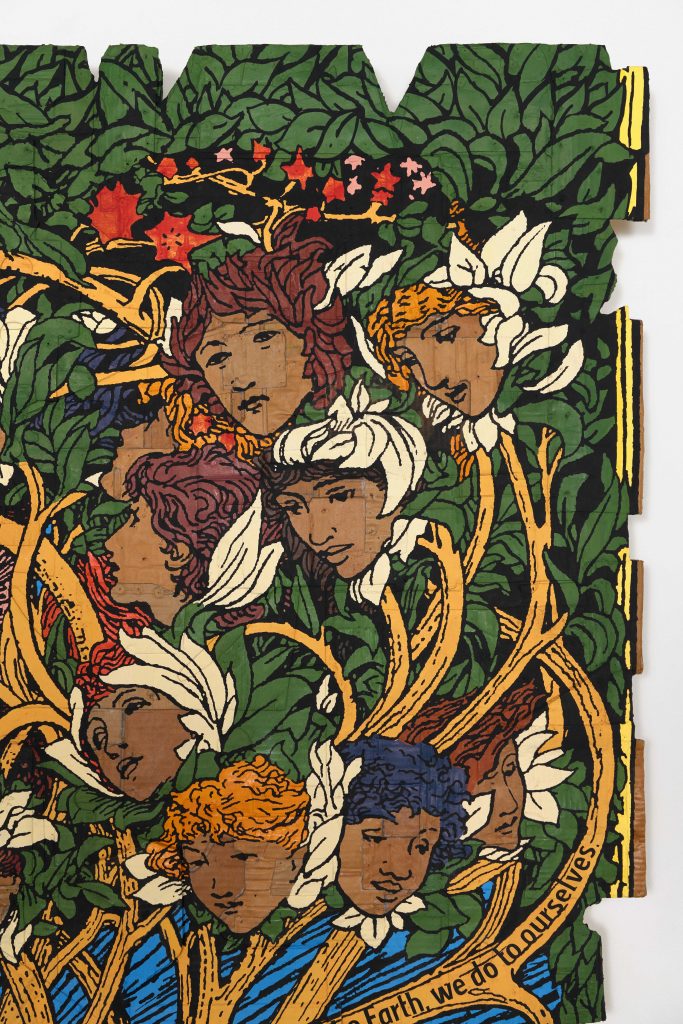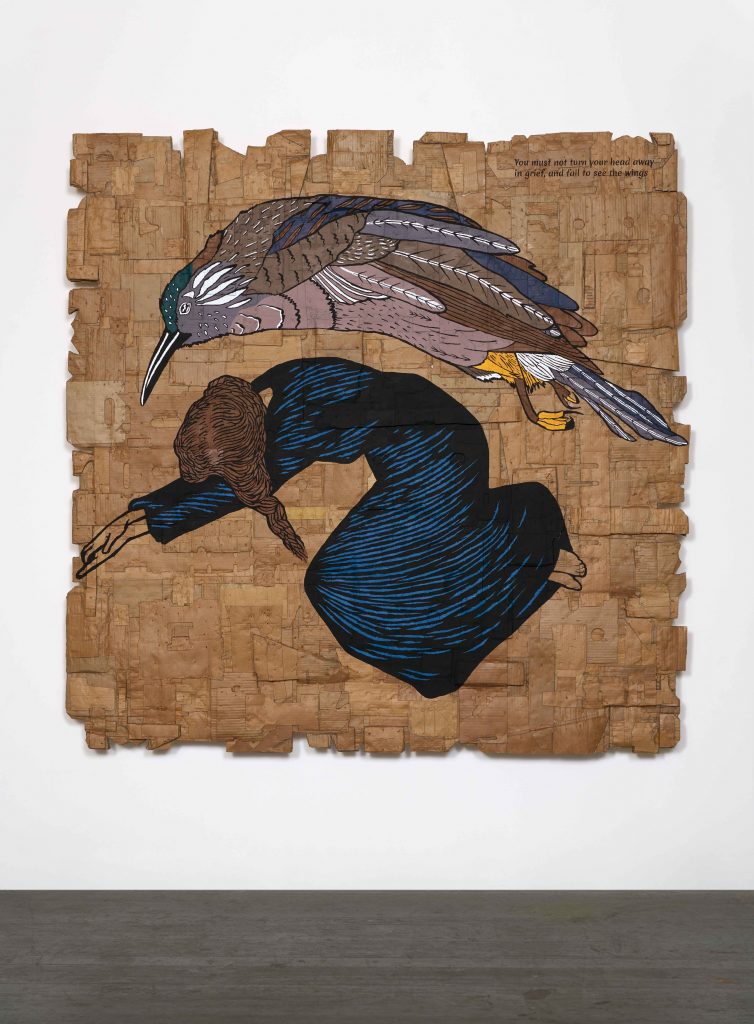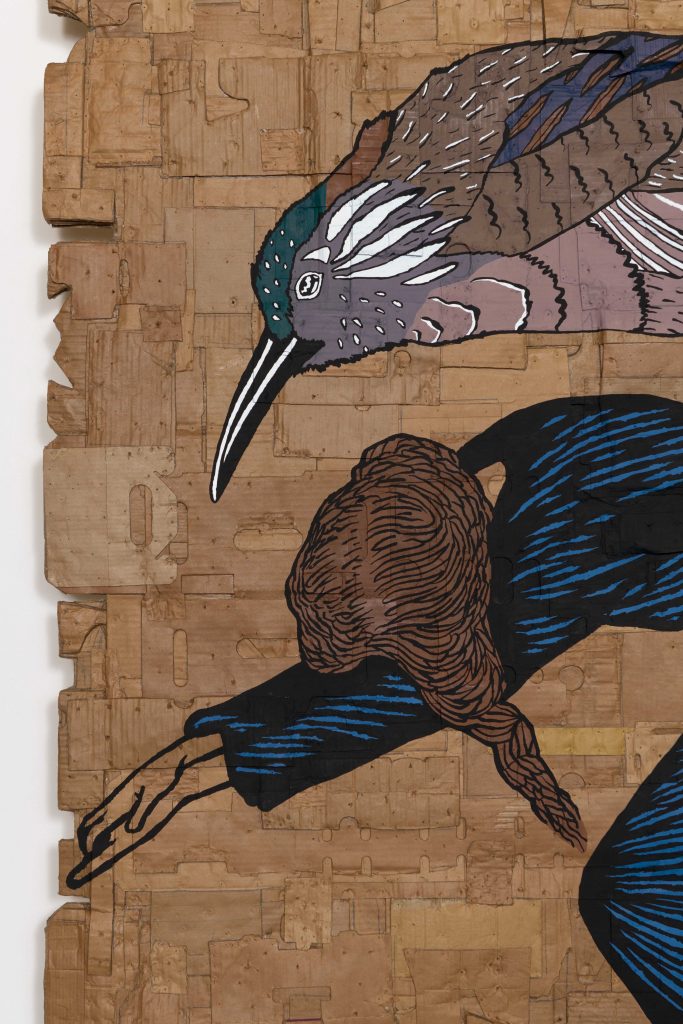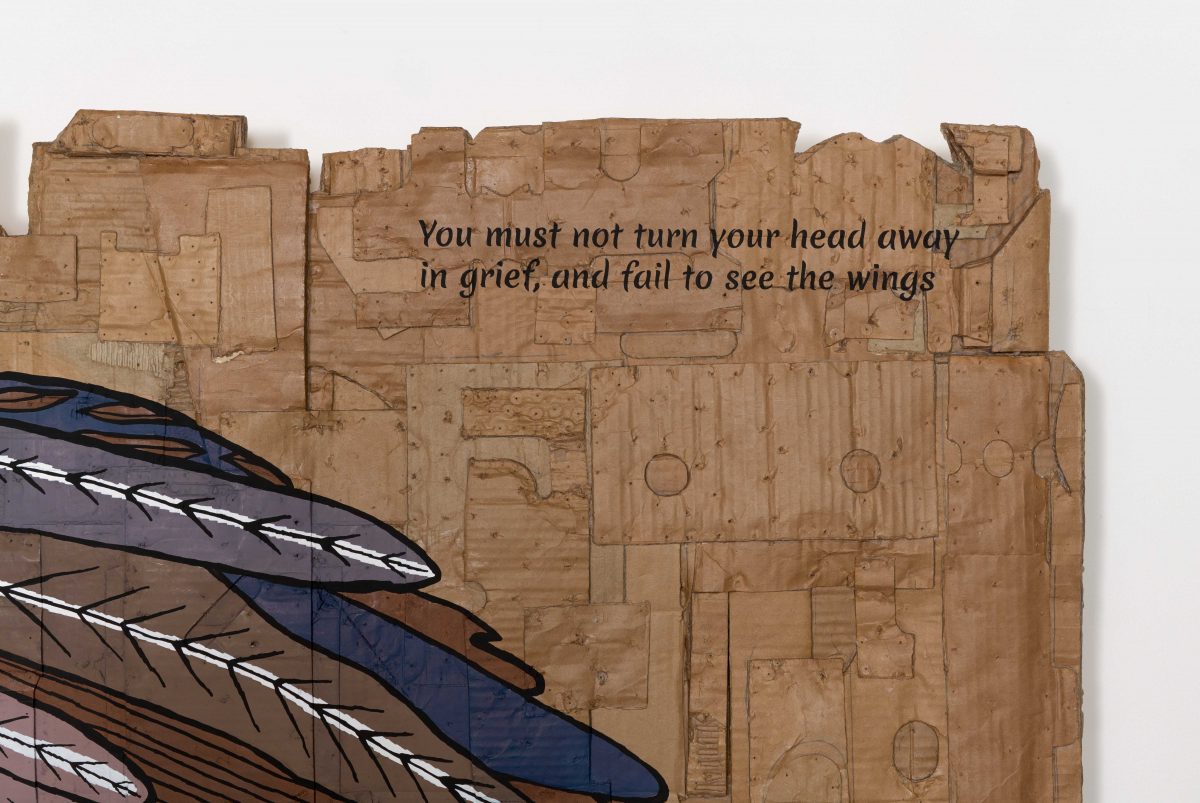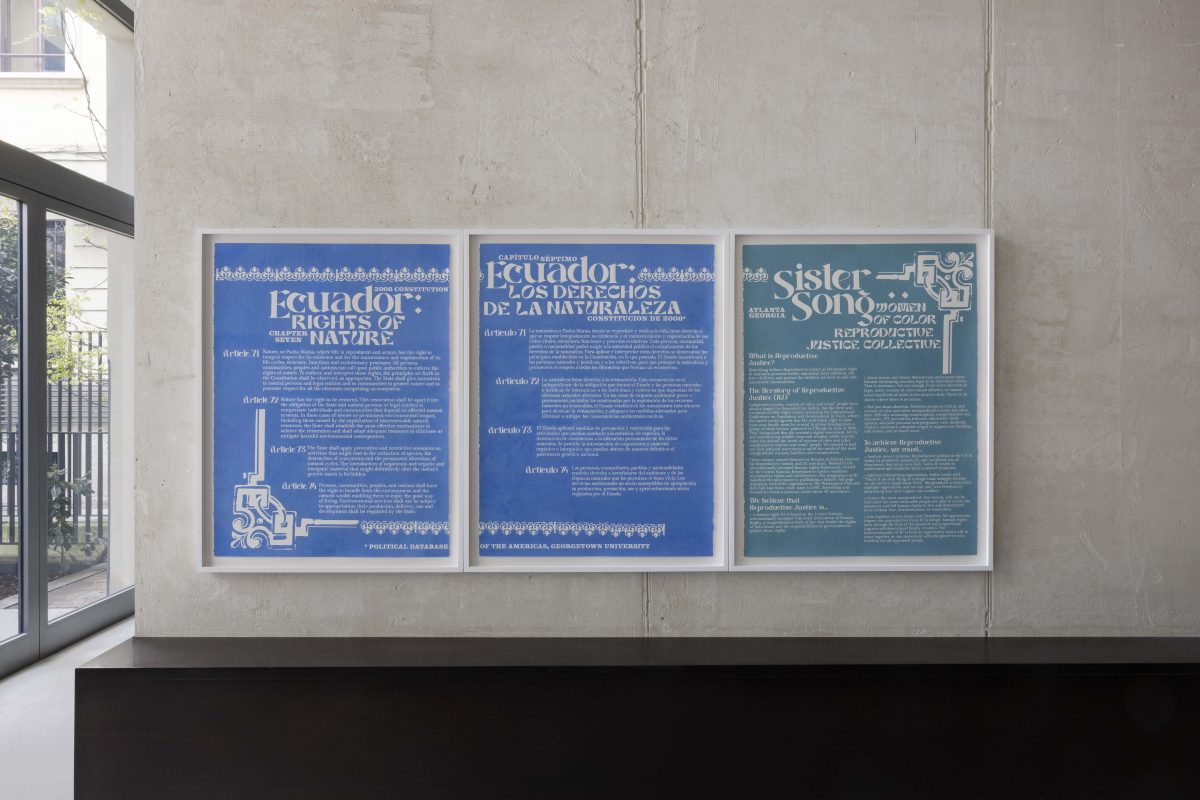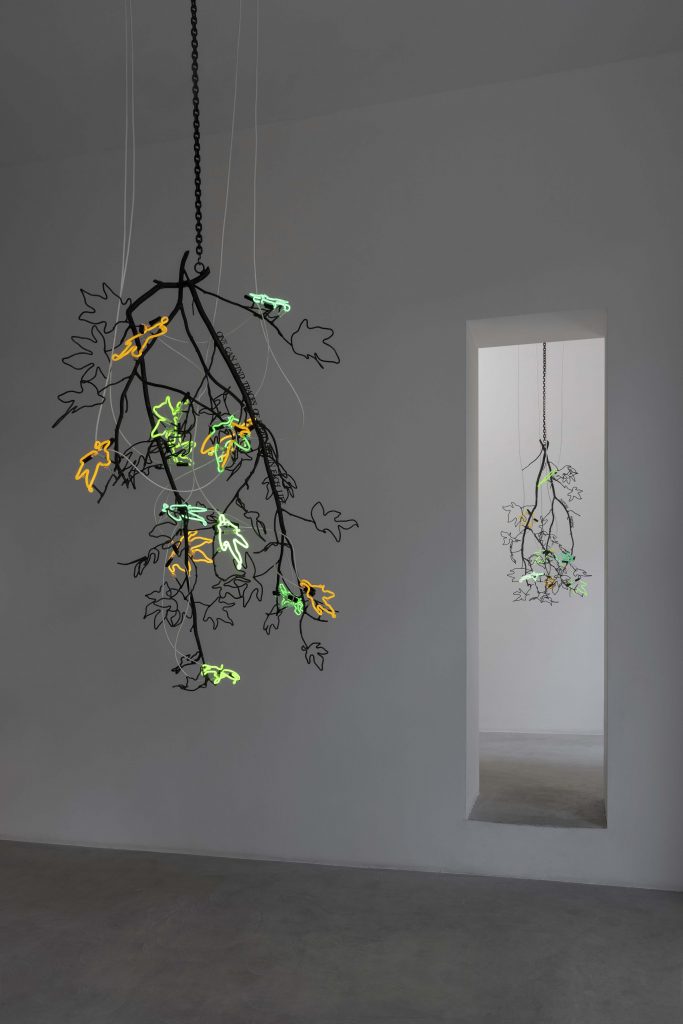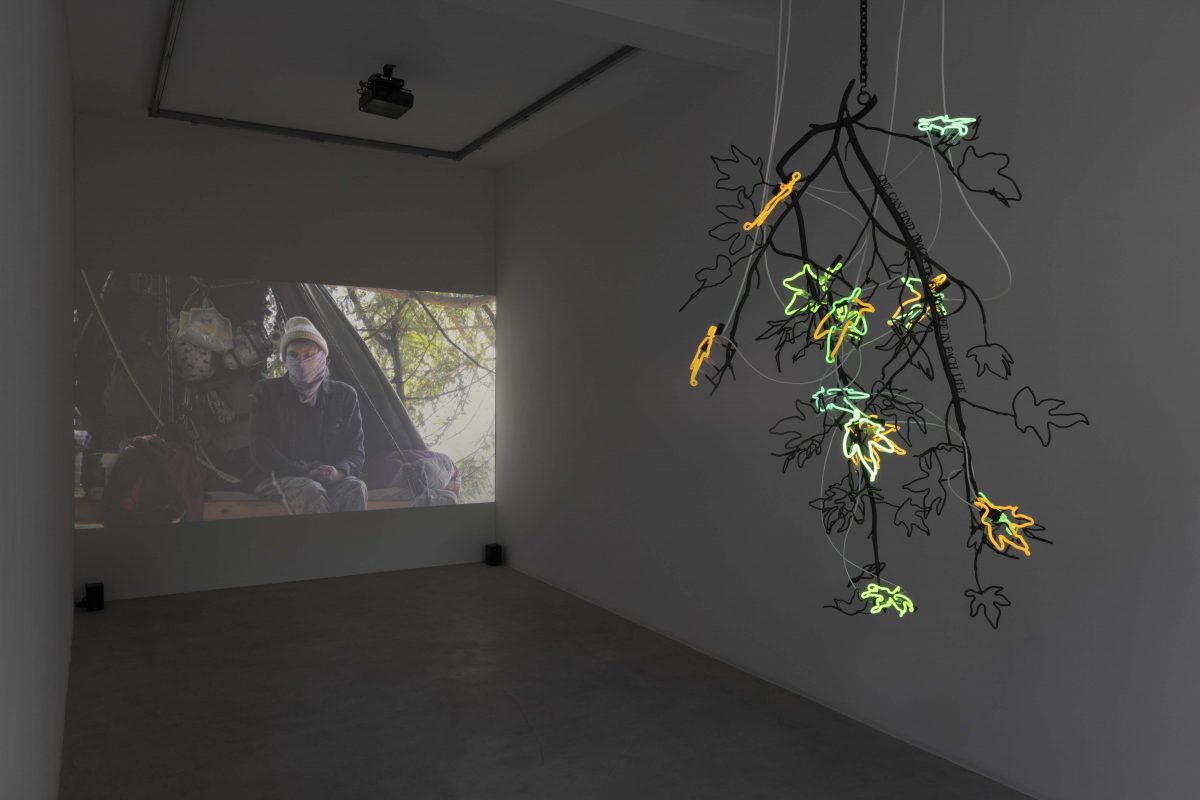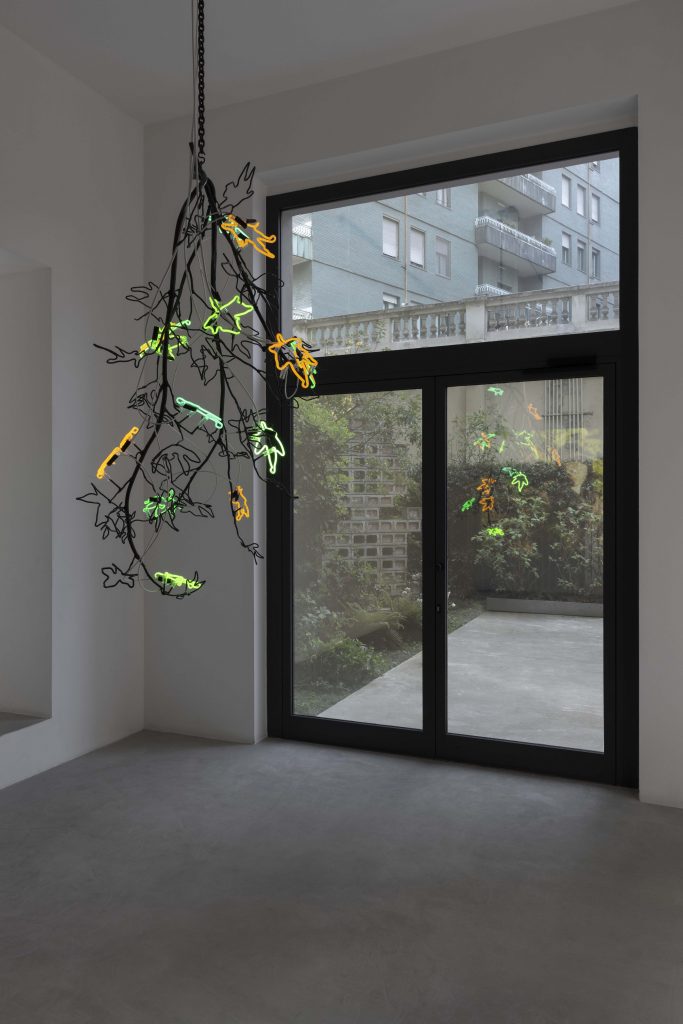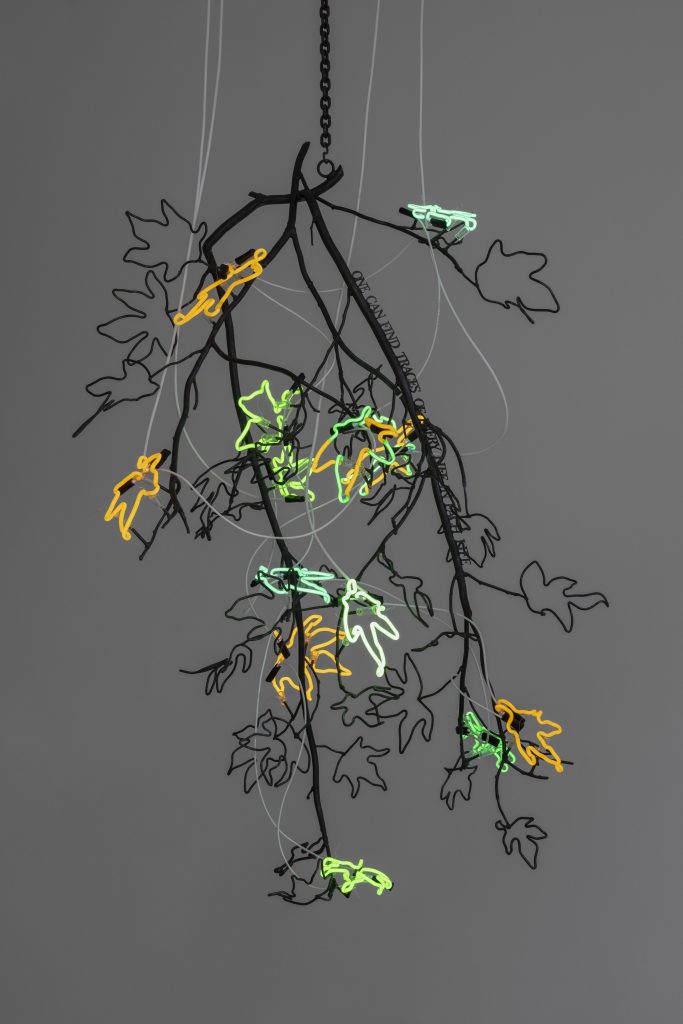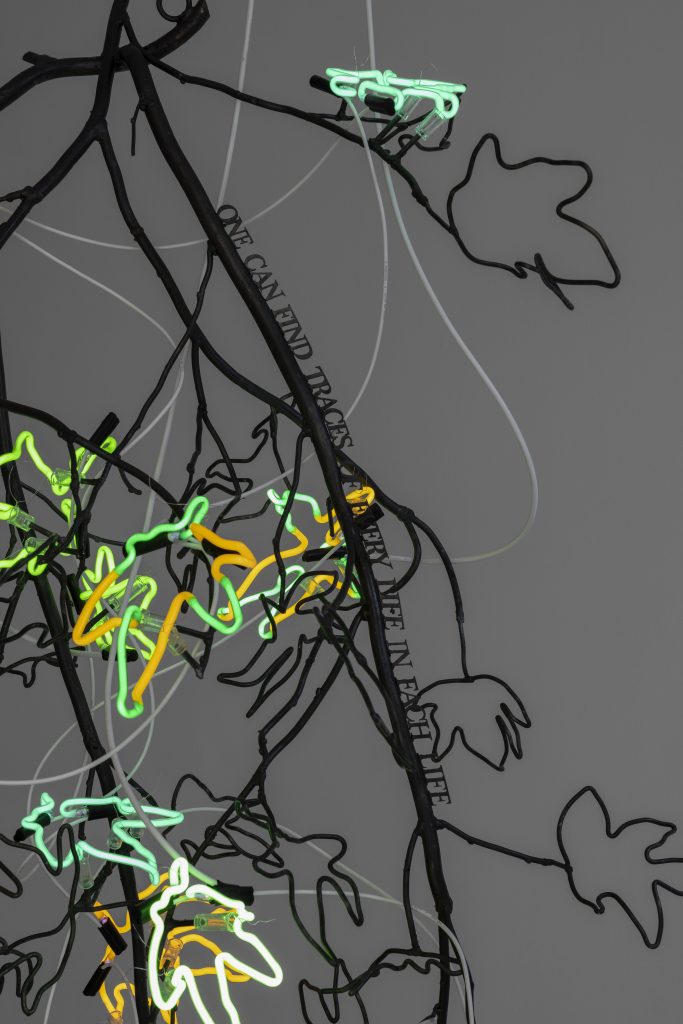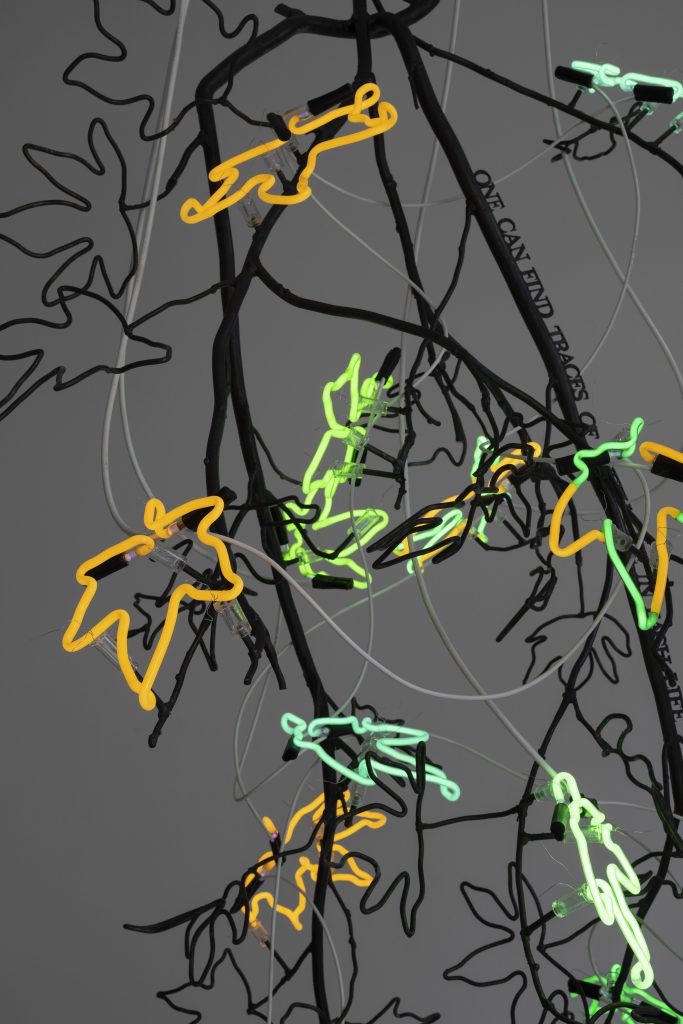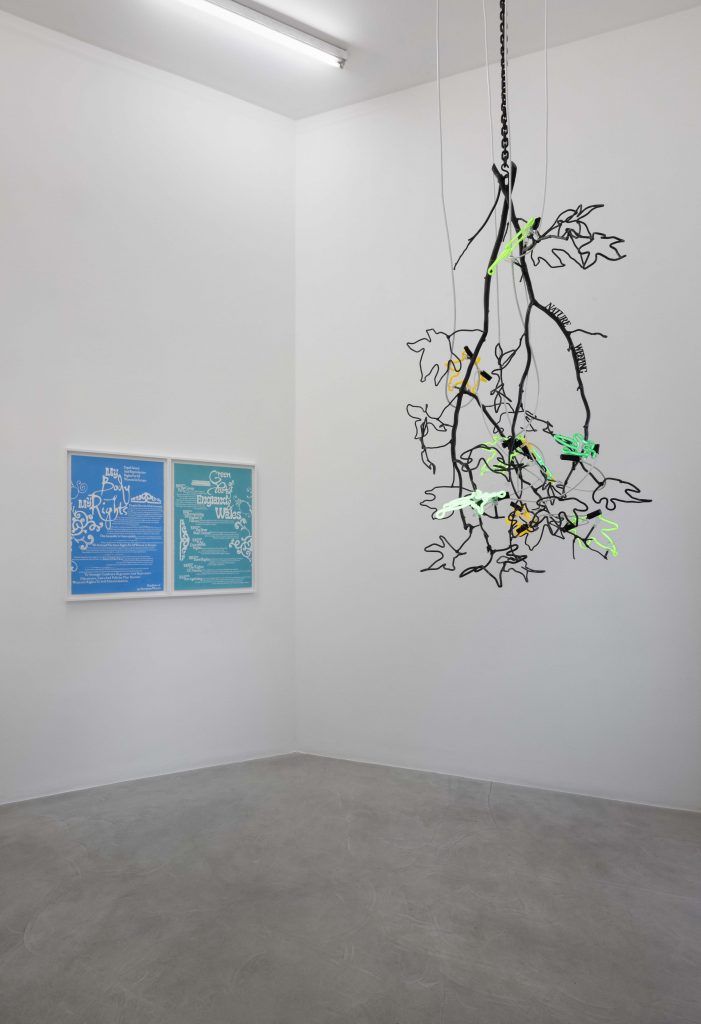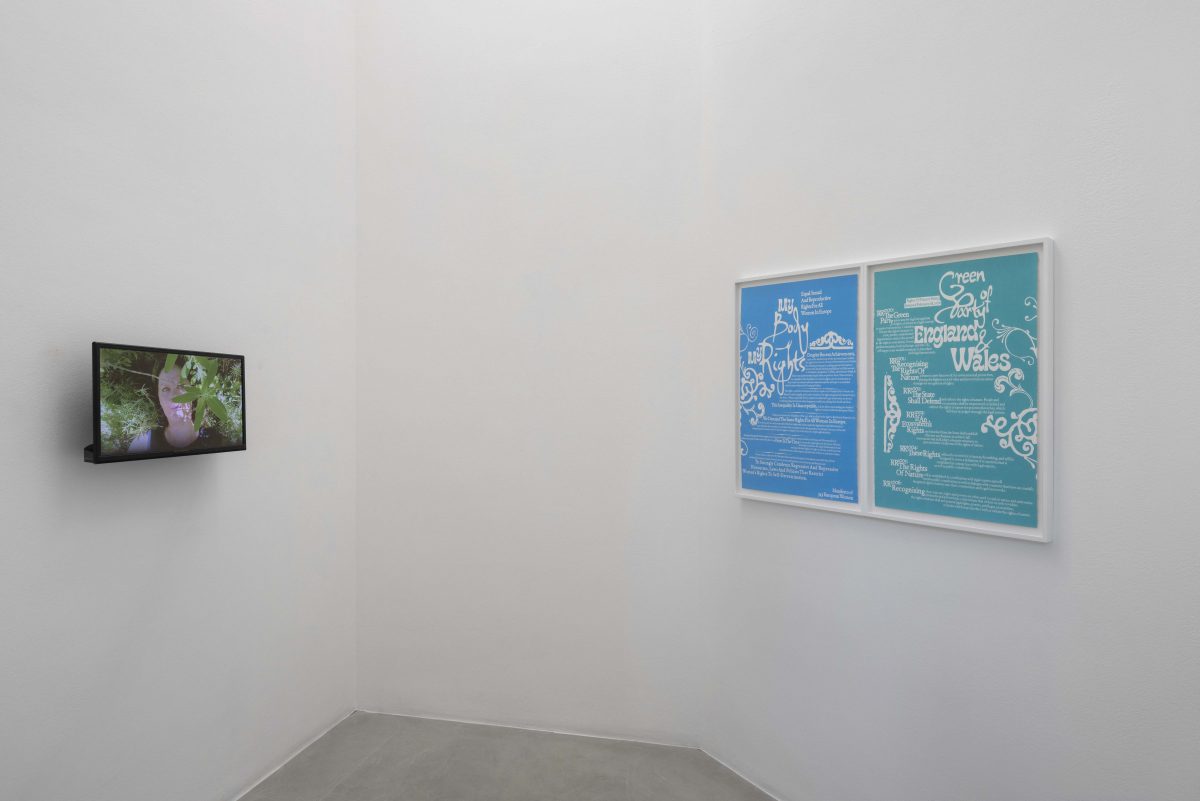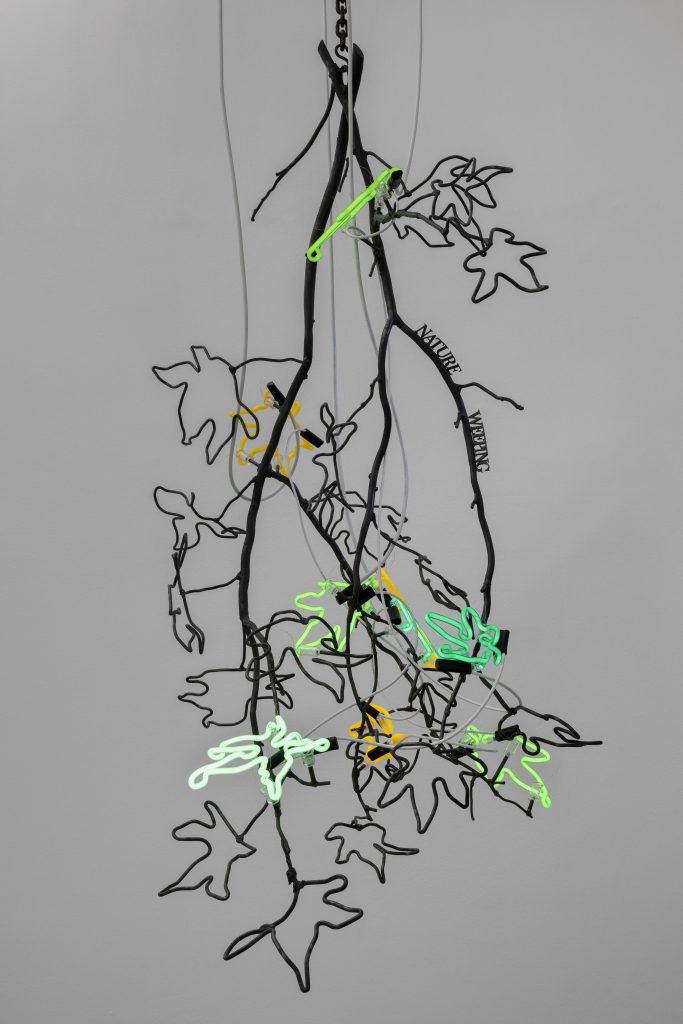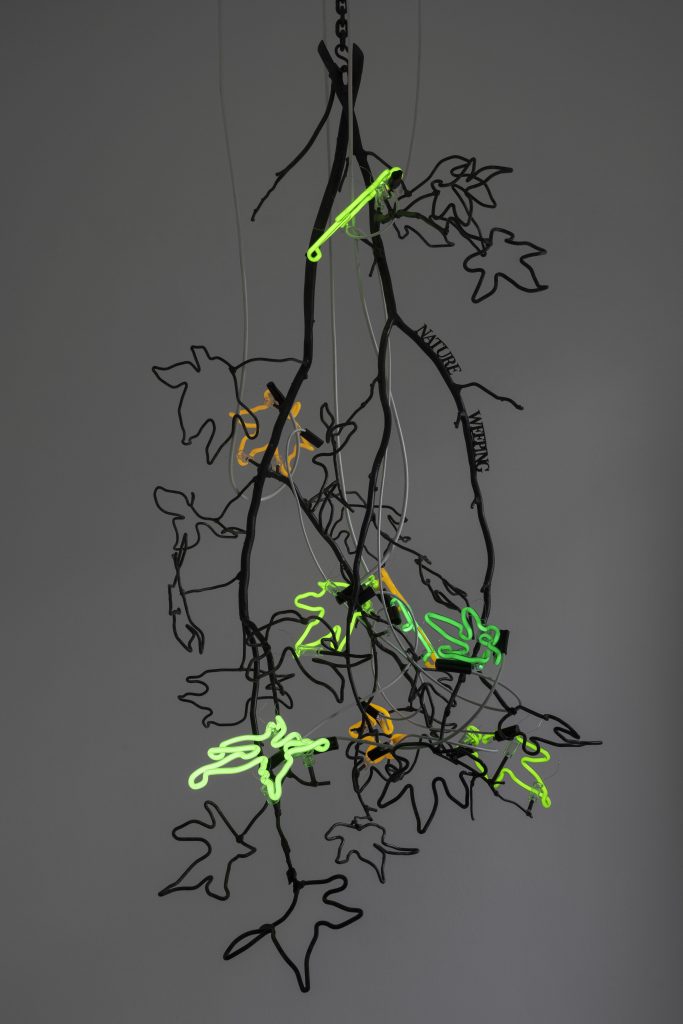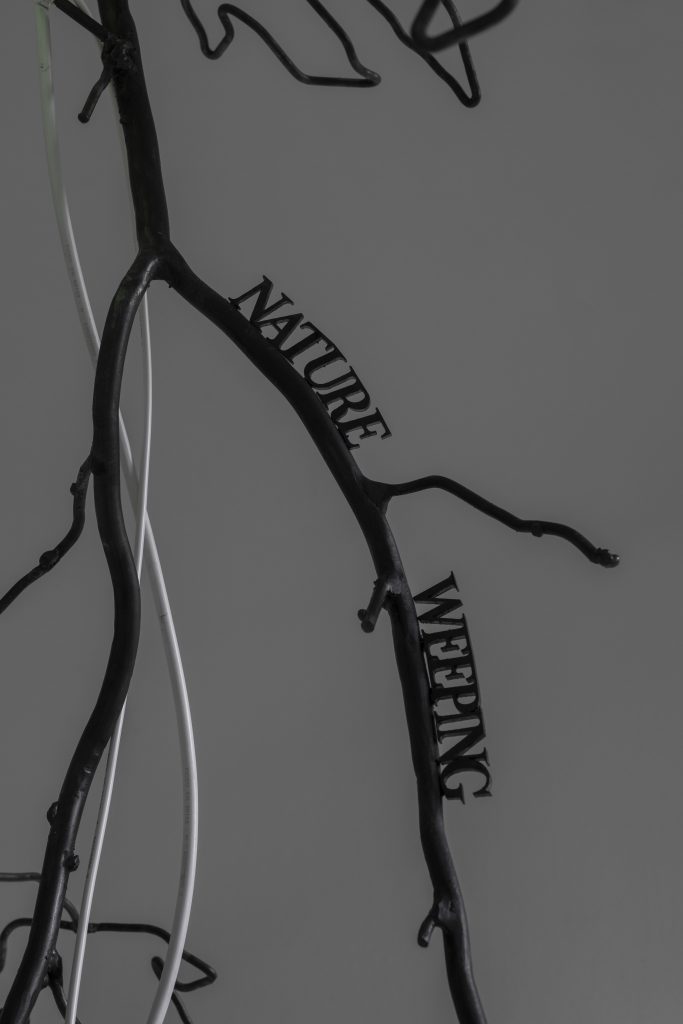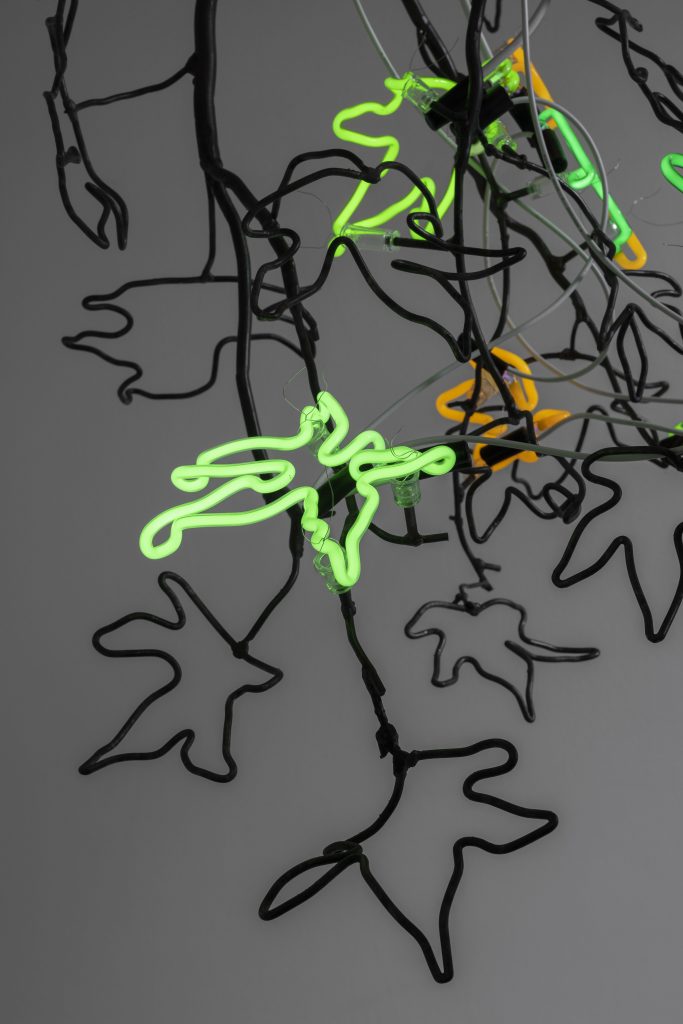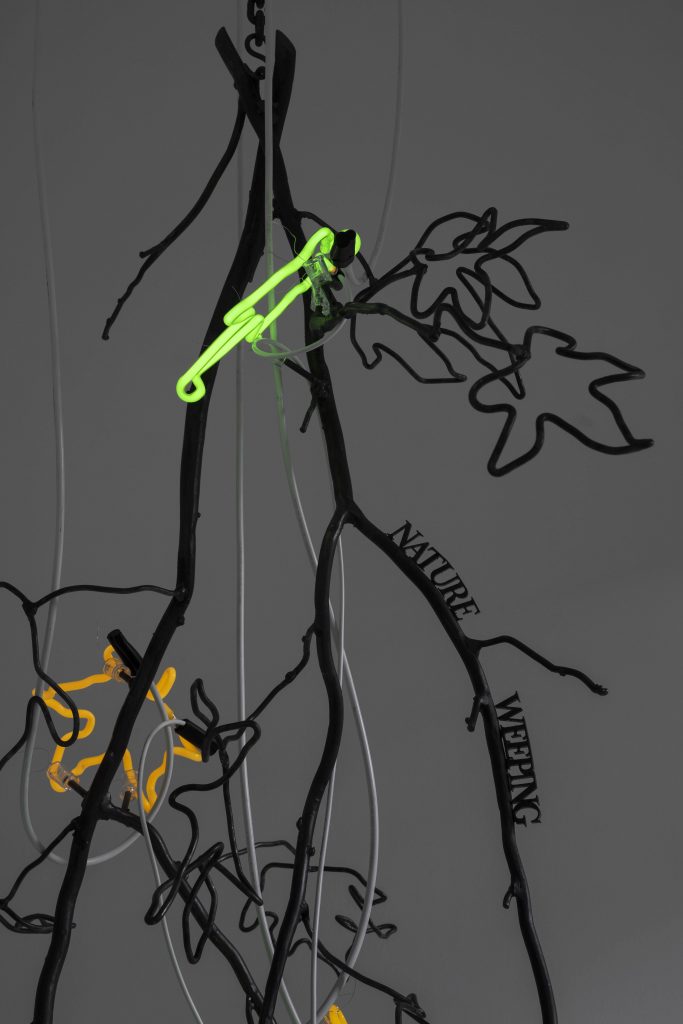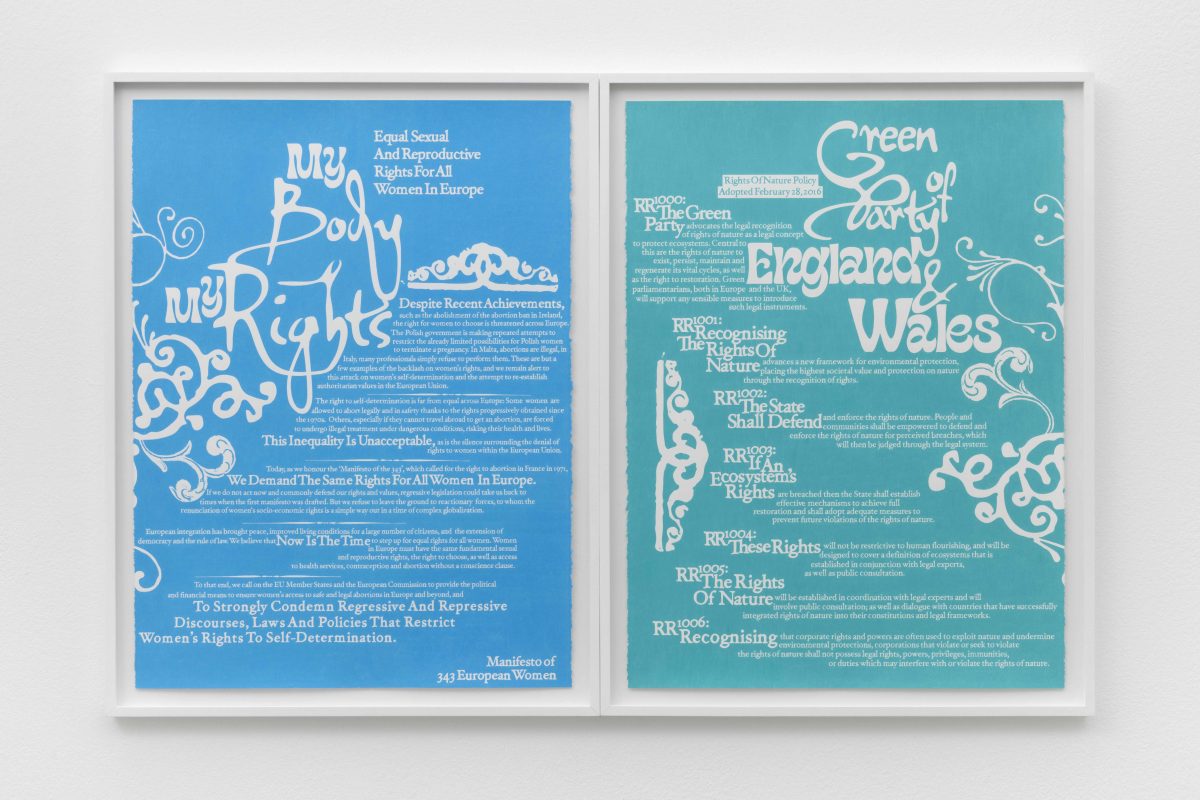
- This event has passed.
kaufmann repetto is pleased to announce You must not turn your head away in grief, Andrea Bowers’ third solo exhibition with the gallery in which she presents a multi-media body of work centered around the theme of eco-grief, the sense of loss that arises from experiencing or learning about environmental destruction or climate change.
You must not turn your head in grief is a show that began with the artist traveling to northern California during the beginning of the Covid pandemic to document the important actions of the Redwood Forest Defenders, a group of young tree-sitters in the ancestral lands of the Tsurai village, also called Trinidad in Humboldt County. They were defending a rainforest from logging by Green Diamond Resource Company for “environmentally friendly” toilet paper, among other greenwashing products. It was a time of sadness and fear throughout the world, and Bowers was looking for hope. She found it in these tree-sitters who committed their lives to “disrupting industrial logging as a way of resisting colonialism, capitalism, and the looming existential crisis of climate change [by] using creative nonviolent direct-action tactics with a commitment to healing the land and each other from the heart of restorative social justice.” It has been two years since Bowers’ visit and their constant presence to defend this forest has kept it standing as the Redwood Forest Defense continues to mobilize against turning the forest ecosystems into timber plantations. The resulting video, “Landscapes We Call Home,” (2022) continues the artist’s interest in documenting important activists of our time.
For the past three years, Bowers has been investigating Ecological Feminism, a theoretical and political movement that critiques patriarchal science for its simultaneous degradation of nature and its oppression of women and gender diverse communities. Ecofeminist poetry and ideology are infused throughout the exhibition, including three new recycled cardboard works. In the largest of these paintings, the artist used an 1897 illustration of a musician with his muses portrayed as women’s faces in trees. Bowers removed the male musician and focused on the relationships between women and nature and included a quote from German ecofeminist and Green Party founder, Petra Kelly. In 2021, 23 species were declared extinct. The other two cardboard works reflect on eco-grief as a newly extinct bird and plant are each combined in similar scale with and image of a woman, the pairings seen from a bird’s eye view. Each has a line of poetry from the healer and poet Deena Metzger.
The Rights of Nature movement, which is gaining recognition throughout the world, elevates human and ecosystem rights above corporate greed by attempting to pass laws that ask that the sphere of nature have the right to “exist, flourish and naturally evolve”. Bowers has been strategizing with two activists from Ohio, Markie Miller of Lake Erie Bill of Rights (LEBOR) and Tish O’Dell from the Community Environmental Legal Defense Fund (CELDF). They have been helping different communities organize and write these declarations. Inspired by their work, the exhibition includes two new drawings from the series, “Rights of Nature and Bodily Autonomy.” These two-toned, intricately colored pencil drawings on paper pay homage and manifest a literal representation of eco-feminism. Rather than just re-printing the texts themselves, the layout is aestheticized and designed with elements of letterpress, with thoughtful attention to the fonts and colors to encourage a deeper reading of these important documents and the alliance building between the rights of nature and women.
At the core ethos of ecological feminism is the embodiment of moral decisions based on community, responsibility, and care; this is further felt in a series of sculptural chandeliers made with recycled iron and neon. These sculptural line drawings entwine with poignant messages detailed in branches, as the curves of Sycamore branches curl in, almost as if in a gesture of embrace towards the viewer reminding us of our interconnectedness. The last work in the show is a video collaboration by Bowers and Suzanne Lacy, honoring the work of eco-feminist poet Susan Griffin in a collective reading by artists and activists from the 1978 book, Woman and Nature, The Roaring Inside Her.
While the images of the destruction of our planet flash through on all forms of popular media, and in front of our own eyes, Bowers’ pays tribute to —and amplifies the voices of— those who are not afraid to look away, and at times place their own lives at risk (as is the case with these tree-sitters). It is said that denial is a common reaction to grief; yet through Bowers’ practice and work, she asks to not look away.
kaufmann repetto è lieta di annunciare You must not turn your head away in grief, la terza personale di Andrea Bowers con la galleria. Nella mostra l’artista presenta un corpus di opere multimediale incentrato sul tema dell’ecological grief, il senso di smarrimento che nasce dall’esperienza della distruzione ambientale e il cambiamento climatico.
You must not turn your head away in grief è una mostra che nasce dai viaggi dell’artista nella California settentrionale all’inizio della pandemia, per documentare le importanti azioni di Redwood Forest Defenders, un gruppo di giovani tree-sitters, che operano nei territori ancestrali del villaggio di Tsurai – chiamato anche Trinidad – nella Contea di Humboldt. Il gruppo è da tempo impegnato nella difesa di una foresta pluviale dall’abbattimento, da parte di Green Diamond Resource Company, al fine di realizzare, attraverso una strategia di greenwashing, carta igienica “ecosostenibile”. In un periodo di tristezza e paura globale, Bowers ha trovato un barlume di speranza, in questo gruppo di tree-sitters, che dedicano le proprie vite a “ostacolare il taglio industriale come metodo di resistenza al colonialismo, al capitalismo e all’incombente crisi esistenziale portata dal cambiamento climatico, attraverso tattiche di azione diretta non violenta volte a guarire la terra e ognuno di noi partendo dal nucleo di una giustizia sociale rigenerante”. A due anni dalla visita di Bowers, le difesa di questa foresta prosegue, grazie alla incessante mobilitazione da parte di Redwood Forest Defense contro la trasformazione di questi ecosistemi forestali in piantagioni di legname. Il video risultato di questa esperienza, “Landscapes We Call Home” (2022), ribadisce l’interesse dell’artista nel documentare importanti attivisti del nostro tempo.
Negli ultimi tre anni, Bowers ha indagato le teorie dell’ecofemminismo, un movimento teorico e politico di critica nei confronti della scienza patriarcale, caratterizzata dalla costante oppressione della natura e di donne e comunità che non rispecchiano una conformita’ di gender. La poesia e l’ideologia ecofemminista imbevono la mostra, come ad esempio nelle tre nuove opere realizzate su cartone riciclato. Nel più grande di questi lavori, l’artista ha rivisitato un’illustrazione del 1897 di un musicista con le sue muse raffigurate come volti di donne tra gli alberi. Escludendo il personaggio maschile dalla composizione, Bowers si è concentrata sul legame tra donne e natura, anche attraverso la citazione dell’ecofemminista e fondatrice del Partito Verde tedesca, Petra Kelly. Gli altri due lavori in cartone riflettono sul tema dell’eco-grief, alludendo all’estinzione di 23 specie nel solo 2021, In entrambe i lavori, che riportano versi della guaritrice e poetessa Deena Metzger. Un uccello e una pianta appena estinti sono ingranditi e affiancati all’immagine di una donna.
Il movimento Rights of Nature, che sta guadagnando consensi in tutto il mondo, pone i diritti umani e dell’ecosistema al di sopra dell’avidità delle imprese, al fine di fare approvare leggi che reclamano per la sfera naturale il diritto di “esistere, prosperare e evolversi naturalmente”. Bowers ha impostato delle strategie insieme a due attivisti dell’Ohio, Markie Miller – di Lake Erie Bill of Rights (LEBOR) – e Tish O’Dell – di Community Environmental Legal Defense Fund (CELDF) – i quali hanno aiutato varie comunità a organizzare e redigere queste dichiarazioni. Ispirata dal loro lavoro, l’artista presenta due nuovi disegni della serie “Rights of Nature and Bodily Autonomy”. Meticolosamente colorati a matita, questi disegni su carta omaggiano l’ecofemminismo attraverso una rappresentazione letteraria. Lungi dall’essere una mera riproduzione, i testi sono abbelliti da elementi grafici e tipografici, con una cura estrema verso i caratteri e il colore, al fine di incoraggiare una lettura approfondita di questi importanti documenti e dell’alleanza in atto tra i diritti della natura e le donne.
Al centro dell’etica ecofemminista è posta l’attuazione di decisioni morali basate su comunità, responsabilità e attenzione; tematica ulteriormente approfondita in una serie di lampadari scultorei realizzati con ferro e neon riciclati. Plastici disegni lineari si intrecciano a struggenti messaggi nelle ramificazioni, mentre i rami dell’acero si piegano come in un abbraccio verso l’osservatore, ricordandoci la nostra interconnessione. Nella mostra è incluso un video, risultato della collaborazione tra Bowers e Suzanne Lacy, che omaggia l’opera della poetessa ecofemminista Susan Griffin attraverso una lettura collettiva da parte di artisti e attivisti di estratti del suo libro del 1978, Woman and Nature, The Roaring Inside Her.
Mentre le immagini della distruzione del nostro pianeta appaiono su tutti i media più diffusi, e davanti ai nostri occhi, Bowers omaggia e amplifica le voci di coloro che non hanno paura di prenderne atto e di mettere a rischio la propria vita (come nel caso dei tree-sitter). Se la negazione è una reazione naturale al lutto, con la sua pratica e la sua opera Bowers ci chiede di non distogliere il nostro sguardo.

